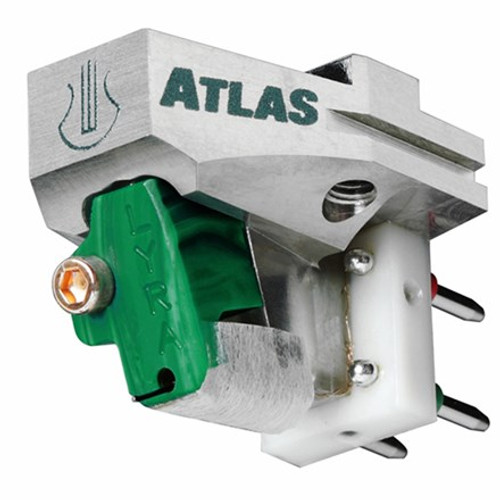Innovative Asymmetric Design for Reference Effortlessness, Speed, and Precision: Lyra Atlas Mono MC Phono Cartridge Brings Out Ultimate Performance from Mono Vinyl LPs
Strictly designed for superlative mono vinyl playback, Lyra's extraordinary Atlas Mono MC phono cartridge features an innovative asymmetric design that helps allow this hand-made design to play with an effortlessness, energy, speed, naturalism, and precision that redefines what is possible from analog performance. By literally misplacing the "barriers" to great sound present in all cartridges, Atlas Mono achieves a number of important performance benefits. Different-shaped structures on the left and right sides of the body suppress the formation of standing waves within, resulting in a significant reduction of resonance-induced colorations. Music comes through the hand-built, Japan-made, individually tuned, and repetitively inspected Atlas Mono with a greater purity and sense of purpose than that of most every other cartridge in existence. With Atlas Mono, you're not just listening to records. You're sharing in the artists' visions and experiences.
Why Asymmetric Construction Matters to the Sound You Hear
Atlas' asymmetric construction offsets the front magnet carrier and its associated mounting system so that it is no longer in line with the cantilever assembly. This opens up a direct, solid path between the cantilever assembly and tonearm headshell so that vibrations from the cantilever can be quickly drained away once they have been converted into electrical signals.
Optimal Performance: "New Angle" Technology and Seamless Cantilever Connection
Atlas uses Lyra's "New Angle" technology, which mechanically pre-biases the signal coils so that they are perfectly aligned to the front and rear magnets during LP playback. This equalizes out discrepancies in vertical and horizontal compliance, and enables the Atlas' coils to move with equal ease in all directions for optimal performance. Lyra also remains the only cartridge manufacturer to mount the cantilever assembly directly into the cartridge body, thereby achieving a totally seamless, rigid connection between the cantilever assembly and headshell. Its effectiveness has been further enhanced as a result of the asymmetrical structure. Control over spurious resonance is also assisted by the use of a narrowed mounting area, which couples the Atlas more tightly to the headshell and facilitates the transfer of vibrational energy into the tonearm.
Incredible Rigidity, Authoritative Tracking, Ultra-Low Distortion, Sublime Efficiency
While Atlas retains the yokeless dual-magnet system, diamond-coated boron rod cantilever, and variable-radius line-contact stylus of the Lyra Titan, the rigidity of the double knife-edge cantilever assembly mounting structure is increased and the signal coil system completely new. Rather than a square, the coil former is in the shape of an X, which allows each channel to operate with greater independence from the other. The result: Better tracking, tighter channel matching, improved separation, and lower distortion due to crosstalk. At the same time, Lyra increased both the performance and efficiency of the generator coils. Atlas has 12% higher output voltage than Titan, but accomplishes this while reducing the amount of wire in the coils by 22%. This reduction in mass further improves tracking performance, while the enhanced output and electrical characteristics allow phono preamplifiers to perform more efficiently.
Contact and Non-Contact Machining to Further Lessen Resonances
Atlas uses a body meticulously carved from a solid billet of titanium via a process that involves both contact (for the exterior) and non-contact machining (for the interior body structures). By making most of Atlas' body surfaces non-parallel (avoiding dimensions that are multiples of other dimensions), and adding a pre-stressed phase-interference resonance-controlling system, resonances are further inhibited.






































